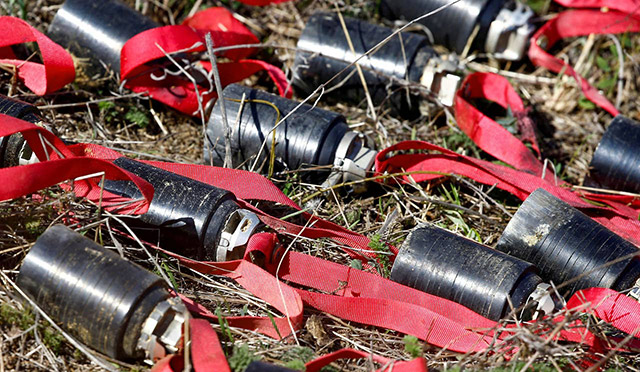By Harut Sassounian
Publisher, The California Courier
Israeli journalist Yossi Melman wrote a lengthy critical article in the Haaretz newspaper about Israel’s sale of banned deadly cluster bombs to Azerbaijan to kill and maim innocent Armenian civilians in Artsakh. The article, although published on Oct. 22, 2020, retains its relevance given the fact that these cluster bombs were not only used in last year’s Artsakh war by Azerbaijan, but may also be used in a future war.
Amnesty International confirmed that Azerbaijan used Israeli cluster bombs in the 2020 Artsakh war. These lethal bombs exploded in a residential area near the city of Stepanakert, the capital of Artsakh.
“The use of cluster bombs in any circumstances is banned under international humanitarian law, so their use to attack civilian areas is particularly dangerous and will only lead to further deaths and injuries,” said Denis Krivosheev, Amnesty International’s acting chief for Eastern Europe and Central Asia. “Cluster bombs are inherently indiscriminate weapons, and their deployment in residential areas is absolutely appalling and unacceptable.”
Melman explained that “a cluster bomb is a kind of container holding a bundle of small bombs. The mother bomb explodes at a certain height and, over a wide area, scatters the smaller bombs, which explode a short time later. The munitions can be launched from cannons of various sizes, with diameters up to 155 mm, from launchers, helicopters and planes.” Children often pick up unexploded cluster bombs mistaking them for toys, resulting in their death or injury.
Melman wrote that he asked Israel’s Defense Ministry, the Israel Defense Forces and the Foreign Ministry “on whether — and if so, when — Israel supplied cluster bombs to Azerbaijan.” Not surprisingly, he received no response.
Melman remarked that Israel’s Defense Ministry, “true to its aggressive habits, is loath to give explanations and refuses to answer questions it doesn’t like. It seems to have something to hide, especially when it comes to its overly intimate relationship with Azerbaijan.”
Melman asked a pertinent question: “Why is Israel arming Azerbaijan against Armenia?” There would be a huge worldwide outcry if Armenia were to transfer missiles to Hamas or Hezbollah to attack Israeli citizens. Israel arming Azerbaijan is no different, but where is the international condemnation of Israel?
Israel used cluster bombs on several occasions: In the 1973 war against several Arab states, the wars on Lebanon in 1978, 1982 and 2006, and the Gaza war in 2008-09. Melman reported that “this led to a condemnation by then-UN Secretary General Kofi Annan, and to tension in the United States, because the firing apparently violated the restrictions on using cluster bombs when the weapon was supplied in 1976.”
The Winograd Committee, formed by the Israeli government to review the appropriateness of Israel’s military actions in Lebanon in 2006, “harshly criticized the use of cluster bombs in civilian areas,” according to Melman. It is illegal to use cluster bombs. It is also illegal for the United States to sell them to Israel, which in turn illegally sold them to Azerbaijan.
Regrettably, neither the Republic of Armenia nor the Armenian-American community complained to the American government about Israel’s illegal transfer of U.S. cluster bombs to Azerbaijan.
Melman reported that “in December 2008, the Convention on Cluster Munitions was signed in Oslo. It prohibits the use, development, manufacture, storage and transfer of cluster bombs, which it defines as ‘a conventional ammunition that is designed to disperse or release explosive submunitions’ from a container. Over 100 countries signed the accord, which went into effect in 2010.”
Israel, however, refused to join the convention that banned cluster bombs. Ironically, Israel was quick to condemn Syria for its reported use of cluster bombs inside its own country. It is not clear why Armenia refused to join the convention which would have given it a stronger footing to condemn the illegal use of cluster bombs by Azerbaijan and Turkey, neither one of which joined the convention. In addition to selling cluster bombs to Azerbaijan, Israel also sold them to Turkey, Ethiopia, Germany, India, Romania, Switzerland, Great Britain, Austria, Denmark, Norway, Chile, Colombia and Venezuela.
According to Melman, Azerbaijan was the largest market for Israeli cluster bombs, along with various cannons and rocket launchers. “Israel sold dual-purpose munitions components, which can also be used in cluster bombs, in a way that let Israel bypass the convention.”
Melman reported that, a year ago, Israeli “activist Eli Joseph, who takes part in efforts to ban weapons sales by Israel to dictatorial regimes,” petitioned in vain Israel’s High Court of Justice, “demanding that Baku and Jerusalem’s military connections be revealed. Also, Joseph and his colleagues in the Jewish Heart organization demonstrated in front of the Knesset against arms exports to Azerbaijan, under the slogan ‘No to war crimes, no to the murder of innocents.’” It is heart-warming to see righteous Israelis objecting to the immoral actions of their government.
By selling lethal weapons to the murderous regime of Azerbaijan, Israel has undermined its moral standing and has become an accomplice to Azeri war crimes.

























































